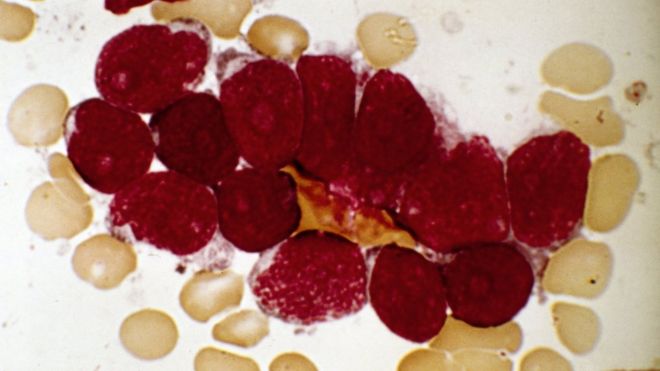- 16 February 2016
- Health
-
(건강) 걸음마 단계지만 놀라운 새 암치료법아름다운 인생/건강 2016. 2. 17. 11:58
출처: http://www.bbc.com/news/health-35586834
Excitement at new cancer treatment 새로운 암치료법에 흥분하다
 SPL
SPLA therapy that retrains the body's immune system to fight cancer has provoked excitement after more than 90% of terminally ill patients reportedly went into remission. 암과 싸우는 면역체계를 재훈련하는 테라피가 말기암을 앓는 환자들의 90% 이상이 차도를 보이자 (전문가들의) 흥분을 유발하고 있다
White blood cells were taken from patients with leukaemia, modified in the lab and then put back. 적혈구 세포들을 백혈병 환자에게서 떼어내 실험실에서 유전자조작을 한다음 다시 원위치시켰다.
But the data has not been published or reviewed and two patients are said to have died from an extreme immune response. 결과에 대한 데이타는 아직 발표되지 않았거나 평가되지 않은 상태이며, 환자 2명이 과잉 면역 반응 때문에 사망한 걸로 알려졌다.
Experts said the trial was exciting, but still only "a baby step." 전문가들은 이번 시도가 흥분감을 자아내지만, 아직은 단지 "걸음마 단계"일 뿐이라 전했다.
The news bubbled out of the American Association for the Advancement of Science's annual meeting in Washington DC. 이 소식은 워싱턴 DC에 있는 미국과학발전협회의 연례회의에서 터져 나왔다.
The lead scientist, Prof Stanley Riddell from the Fred Hutchinson Cancer Research Centre in Seattle, said all other treatments had failed in these patients and they had only two-to-five months to live. 책임 과학자인 프레드 허치슨 암연구센터(시애틀 소재) 의 스탠리 리델 교수는 기타 모든 암치료 방법들은 이 환자들에게 실패했으며 이 환자들은 단지 2개월에서 5개월 더 살았다고 전해주었다.
He told the conference that: "The early data is unprecedented." 이 연례모임인 컨퍼런스에서 그는 "초기 데이타는 전례가 없는 것이다"고 말했다.
Re-training 재훈련
In the trial, cells from the immune system called killer t-cells were taken out of dozens of patients. The cells normally act like bombs destroying infected tissue. 수십명의 환자들로부터 암세포킬러인 T세포라 불리는 면역체계에서 세포들을 떼너냈다. 이 세포들은 정상적으로 감염된 조직을 죽이는 폭탄과 같은 역할을 수행한다.
The researchers genetically modified the t-cells to engineer a new targeting mechanism - with the technical name of chimeric antigen receptors - to target acute lymphoblastic leukaemia. 연구원들은 급성 림프아구성 백혈병을 목표로 삼아, 키메릭 항원 수용체(별칭: 인조 T세포 수용체)라는 이름을 지닌, 새로운 대상의 메카니즘이 작동하도록 T세포들을 유전자 조작을 행했다.
Prof Riddell told the BBC: "Essentially what this process does is, it genetically reprograms the T-cell to seek out and recognise and destroy the patient's tumour cells.
"[The patients] were really at the end of the line in terms of treatment options and yet a single dose of this therapy put more than ninety percent of these patients in complete remission where we can't detect any of these leukaemia cells."
But one cancer expert told me they still felt in the dark on the full significance of the study, as the data is not available.
Also seven of the patients developed cytokine release syndrome so severe that they required intensive care, and a further two patients died.
While those odds may be acceptable if facing terminal cancer, the side-effects are much greater than conventional leukaemia treatments such as chemotherapy and radiotherapy, which work in the majority of patients.
Analysis
By James Gallagher, health editor, BBC News website
The field of immunotherapy - harnessing the immune system to attack cancer - is coming of age.
The significance of today's development is hard to ascertain while the data is unpublished - but the field is undoubtedly making giant strides.
Drugs called checkpoint inhibitors, such as pembrolizumab and ipilimumab, take the brakes off the immune system so it attacks cancer.
They are already being used by doctors.
And other experimental techniques are coming to fruition to allow doctors to change a patient's own cells to engineer a designer immune system to kill cancer.
It's an exciting time that is likely to see immunotherapy soon join chemotherapy, radiotherapy and surgery as major weapons in the fight against cancer.
There is also a big difference between using such approaches on a blood cancer like leukaemia and "solid" tumours such as breast cancer.
Dr Alan Worsley speaking on BBC Breakfast
Dr Alan Worsley, from Cancer Research UK, said that while the field was incredibly exciting, "this is a baby step".
He told the BBC: "We've been working for a while using this type of technology, genetically engineering cells. So far it's really shown some promise in this type of blood cancer.
"We should say that in most cases standard treatment for blood cancer is quite effective, so this is for those rare patients where that hasn't worked.
"The real challenge now is how do we get this to work for other cancers, how do we get it to work for what's known as solid cancers, cancers in the tissue?"
'아름다운 인생 > 건강' 카테고리의 다른 글
(건강) 비만은 나쁜 기억력과 관련 (0) 2016.02.27 (건강) 짐바브웨 정신문제 있는 사람들에게 대화요법 효과 입증 (0) 2016.02.24 (건강) 알츠하이머 병을 예방할 수 있는 약이 있는가? (0) 2016.02.15 (건강) 광선(光線)을 잠깐 쐬는 걸로 비행시차증 극복 (0) 2016.02.10 (건강) 알자지라(Aljazeera)의 한국 음주문화에 대한 보도 (영문) (0) 2016.02.09
